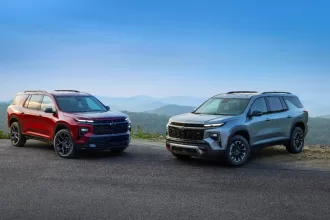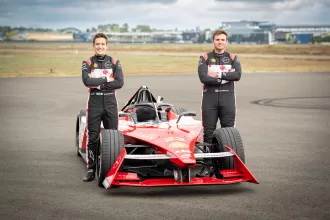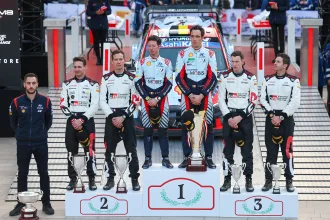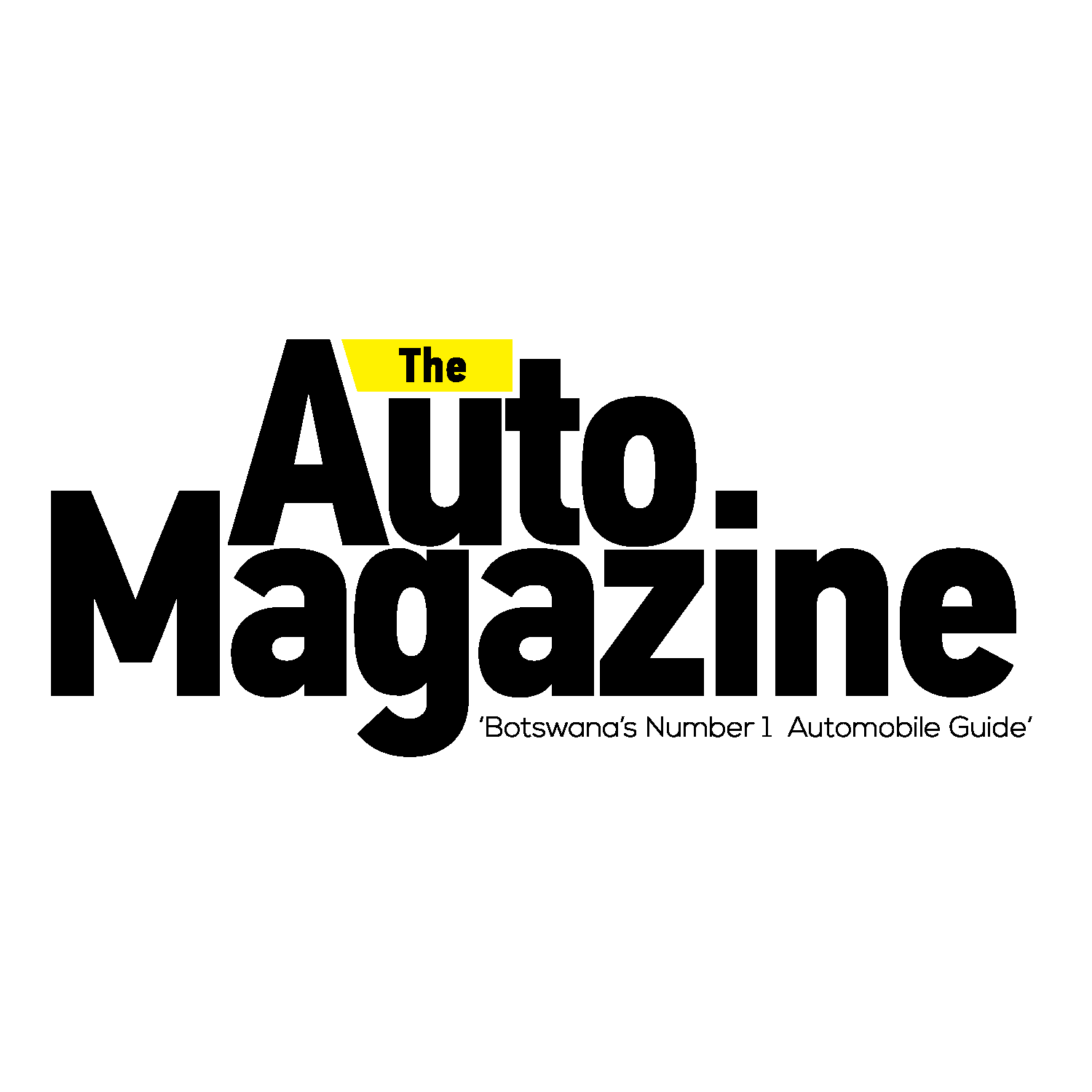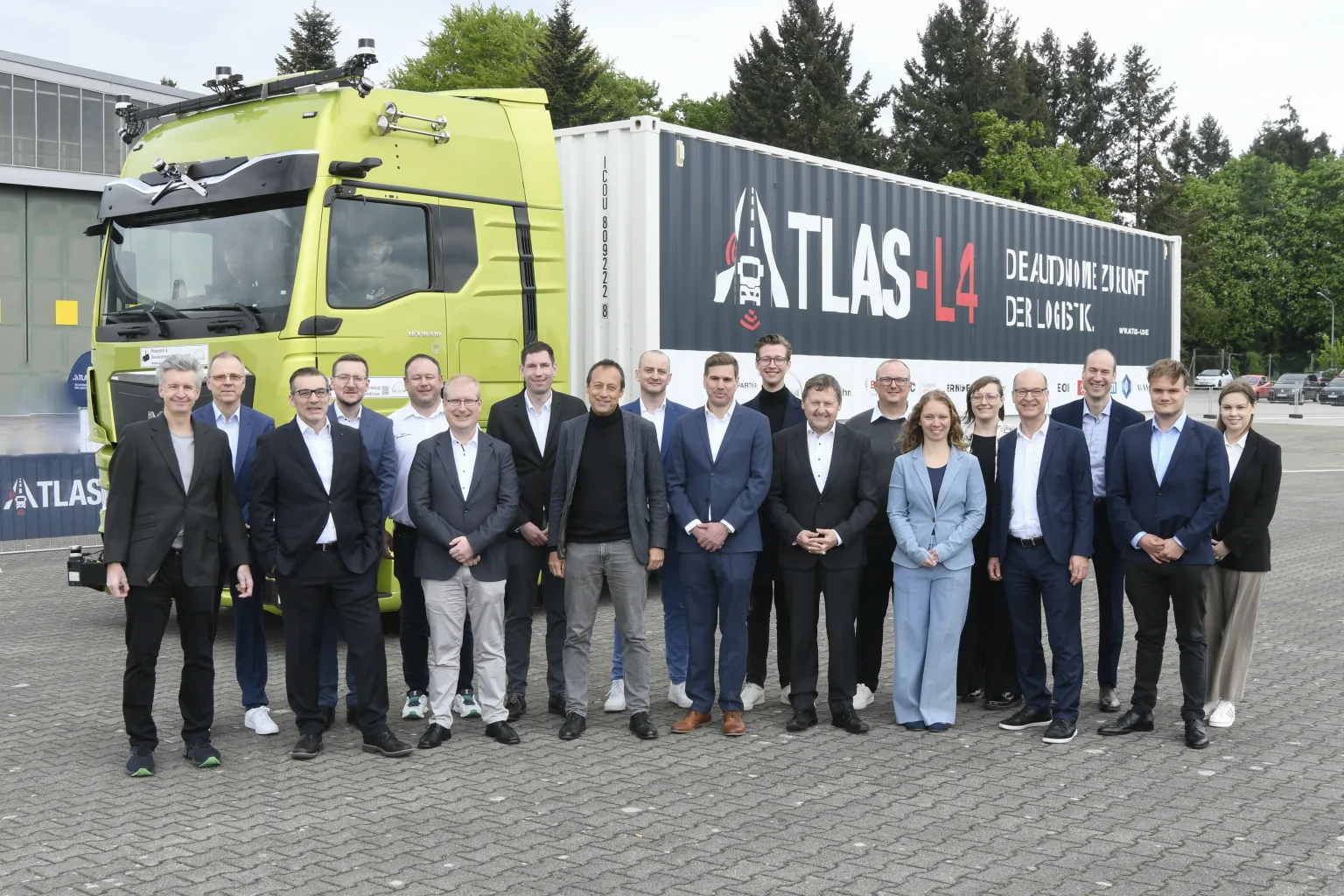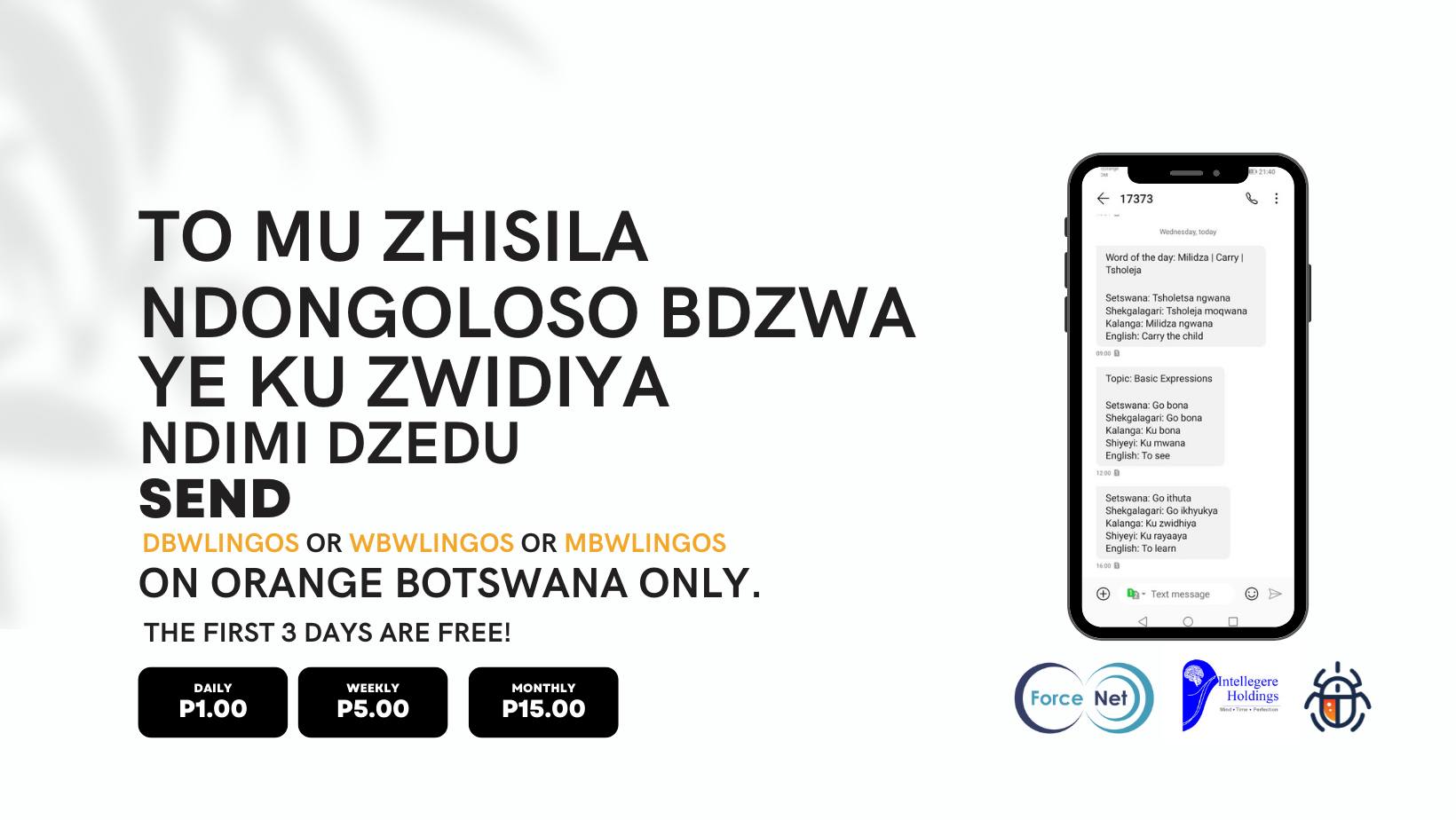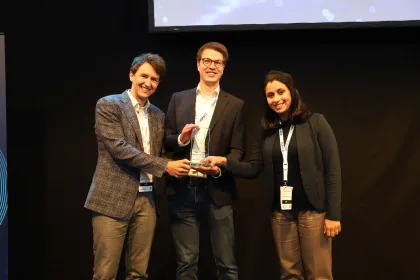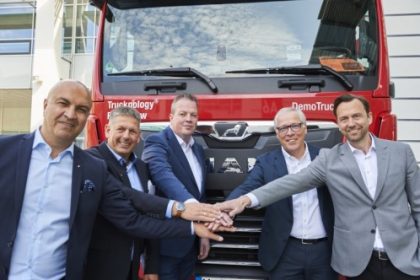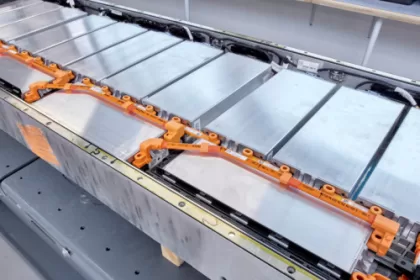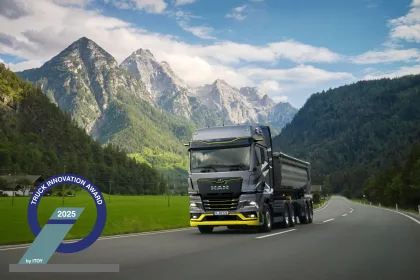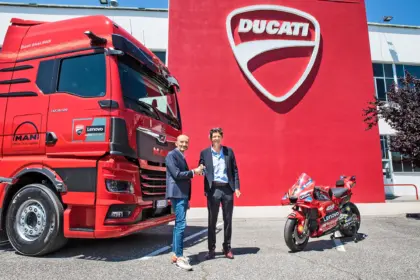- Extensive test phase with valuable findings as pioneering work for the use of autonomous commercial vehicles on motorways and motorways
- First-time application of the German law on autonomous driving in truck hub-to-hub traffic
- Three years of research work by around 150 engineers lay the foundation for future series applications for Logistics 4.0
- Final presentation with driving demonstrations, an exhibition covering 1,000 square metres and numerous specialist presentations in Penzing
After three years, the twelve project partners from industry, science, software development and infrastructure have successfully completed the ATLAS-L4 research and development project (automated transport between logistics centres on level 4 motorways): The autonomous truck in road transport became a reality thanks to the work of around 150 engineers! MAN Truck & Bus, Knorr-Bremse, Leoni, Bosch, Fernride, BTC Embedded Systems, Fraunhofer AISEC, Technical University of Munich, Technical University of Braunschweig, TÜV SÜD, Autobahn GmbH and the Würzburg Institute of Transport Sciences (WIVW GmbH) have joined forces for this project.
The consortium had set itself a clear goal in the project, which was funded by the Federal Ministry for Economic Affairs and Climate Protection and had a total budget of 59.1 million euros: to bring a level 4 automated and thus autonomously driving truck for hub-to-hub transport onto the motorways. The basis for this was the law passed in 2021, which basically enables autonomous driving on defined routes under technical supervision and thus puts Germany in a pioneering role globally.
“Together with our partners, we have set ourselves a high goal and realised an industrialisable basic concept for autonomous driving in hub-to-hub use. The development and integration of the redundant components required for safe use, such as steering, brakes and the vehicle electrical system, as well as the creation of a validation concept required interdisciplinary expertise and close teamwork. As a consortium, we have proven ourselves with this project: Autonomously driving trucks are feasible!” sums up Dr Frederik Zohm, Executive Board Member for Research and Development at MAN Truck & Bus, adding, “Innovations such as autonomous driving require such collaborations in order to effectively advance future technology in Germany and Europe.”
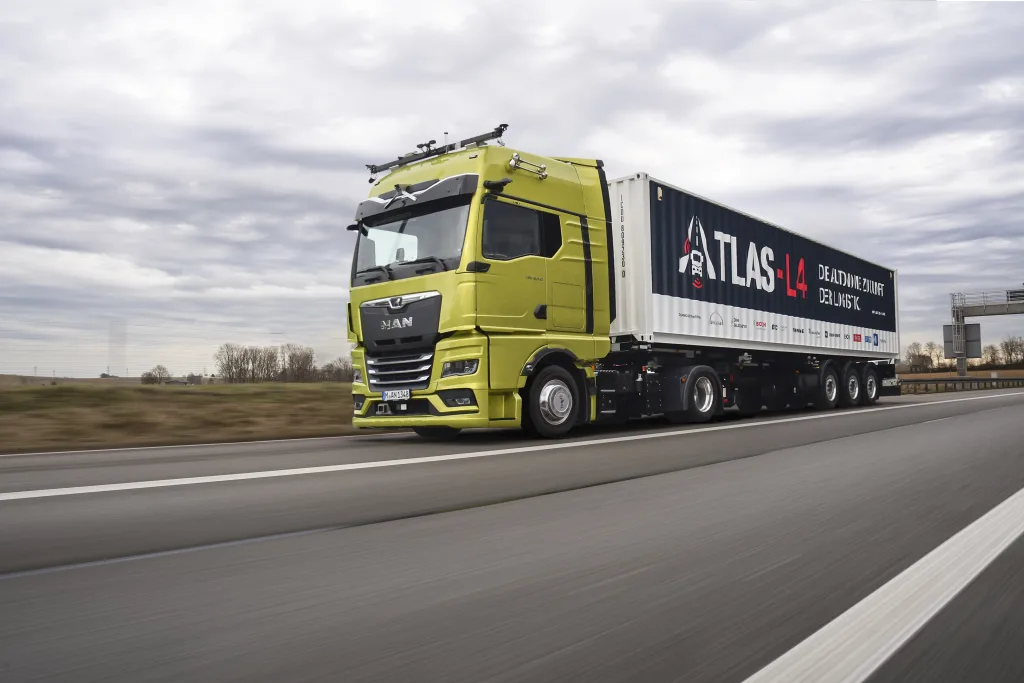
How did the trial phase go?
The starting signal for ATLAS-L4 was given on 1 January 2022. After the Federal Motor Transport Authority granted the first Level 4 test approval for a commercial vehicle manufacturer in April 2024, the premiere on public roads took place with the first motorway drive of an autonomous truck in Germany – with Federal Transport Minister Volker Wissing as a prominent companion. A safety driver was always on board for this and all other test drives. The automation software in the vehicle was continuously optimised through regular releases over a long period of time and tested directly in practice.
Mission accomplished!
The consortium was able to tick all the project objectives: The safety-relevant components for the Level 4 architecture, such as the redundant braking system, on-board network and steering system, were installed. A validation concept was drawn up and the control centre for technical supervision was put into operation at the same time. Risk analyses and safety considerations for Level 4 – including cyber security, for example in the form of authentic and encrypted communication, as well as the definition of functional safety measures such as redundancies and degradation concepts for the autonomous driving system – took place. The result: a prototype technology as a blueprint for further projects and series developments.
What’s next?
The work of ATLAS-L4 can therefore be used as a basic concept for future industrial developments, although various detailed questions still need to be clarified for an autonomous truck in series production, which the project has revealed. “We have done valuable pioneering work by providing practical proof of the technical feasibility of autonomous trucks,” says project coordinator Sebastian Völl, MAN Truck & Bus. “These concepts are now being incorporated into further development work for the series development of autonomous trucks.”
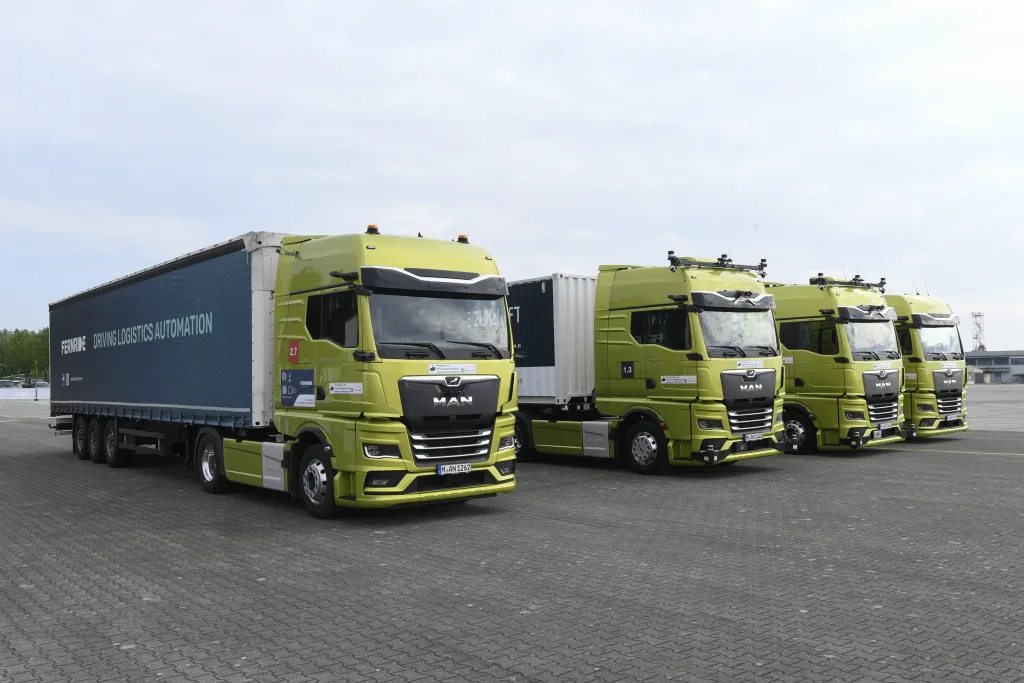
Logistics 4.0 offers a great deal of potential: driverless trucks as part of hub-to-hub automation for shuttle journeys between logistics centres can make an important contribution to greater efficiency and the avoidance of traffic jams and accidents. Automation concepts also offer a solution to the driver shortage that the industry has been suffering from for years. There is already a shortage of around 100,000 truck drivers in Germany.
On 7 and 8 May, the project participants presented the results of ATLAS-L4 to around 200 guests in the presence of representatives of the Federal Ministry of Economics and Climate Protection – with driving demonstrations on the grounds of the ADAC Mobility Test Centre in Penzing and on the motorway, an exhibition covering around 1,000 square metres and scientific presentations.
Further information on the ATLAS-L4 project and the project partners and their individual project results is available online: www.atlas-l4.com
Wide-ranging expertise:
Commercial vehicle manufacturer MAN Truck & Bus was responsible for the overall system development and the integration of all components into the vehicle. MAN was also responsible for data transmission to the vehicle and commissioning the control centre, which will monitor the test drives in line with the technical supervision required by the law on autonomous driving.
Knorr-Bremse, the world market leader for braking systems, developed the special, redundantly designed braking system architecture including steering redundancy through steer-by-brake, which enables the safe operation of a Level 4 truck in any situation.
The project partner LEONI, Europe’s largest on-board power supply manufacturer, ensured that the on-board power supply and the electronic cable distribution of the automation system always function reliably, regardless of any faults that may occur.
Robert Bosch Automotive Steering GmbH has developed a fault-tolerant steering system for ATLAS-L4 that fulfils all the requirements for SAE Level 4 automation.
The Munich-based start-up FERNRIDE GmbH, which specialises in autonomous driving on logistics sites, investigated the possibilities of teleoperation in the hub-to-hub scenario addressed by the project. With FERNRIDE’s teleoperation technology, autonomous vehicles can be monitored and remotely controlled if necessary.
The test tool manufacturer BTC Embedded Systems AG focussed on scenario-based and simulative test approaches for complete vehicle verification and safety validation, with a particular focus on critical driving situations.
In the project, the Fraunhofer Institute for Applied and Integrated Security AISEC extended its methods for cyber security risk analyses to automated trucks for the first time and researched solutions for holistic security management. Security risk analyses and protection concepts for the trucks and their ecosystem were developed on this basis.
The Institute of Automatic Control at TU Braunschweig developed concepts for the safe operation of Level 4 trucks and for the technical self-awareness of automated vehicles, among other things.
The Chair of Automotive Engineering at the Technical University of Munich contributed its expertise in various aspects of vehicle dynamics and developed interaction concepts for technical supervision.
TÜV SÜD contributed its extensive experience with test environments for automated vehicles to the project test drives, tested the capabilities of the vehicles themselves as well as the validity of the simulation and assessed the safety of the vehicles as part of the approval process.
With the law on autonomous driving, the approval of operating zones on motorways is the responsibility of Autobahn GmbH. As part of the project, it developed a digital management system for operating zone approval and contributed its many years of expertise in the field of cooperative and connected driving to the project.
WIVW GmbH set up a teleoperator workstation that allows the control of a virtual truck by coupling it with the driving simulation. The requirements developed for a teleoperator workstation can thus be translated into a concrete concept, implemented, visualised and evaluated.

